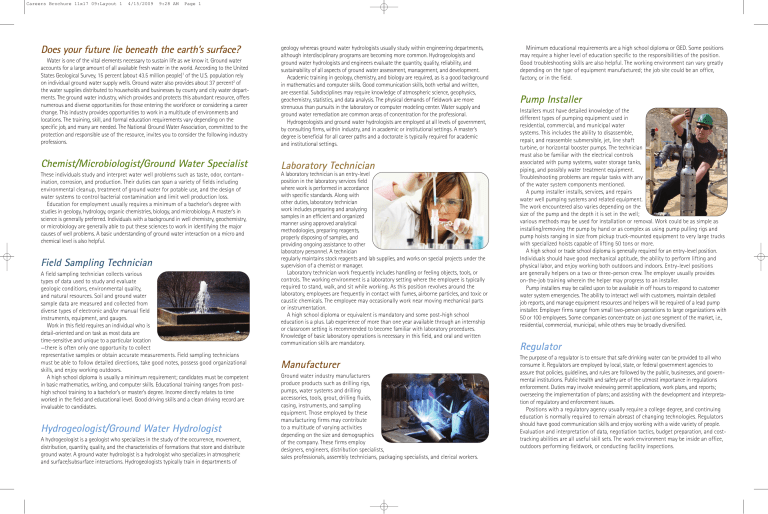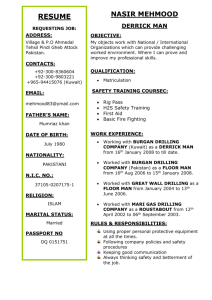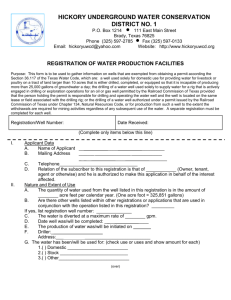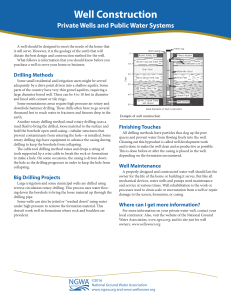Does your future lie beneath the earth’s surface?

Careers Brochure 11x17 09:Layout 1 4/15/2009 9:28 AM Page 1
Does your future lie beneath the earth’s surface?
Water is one of the vital elements necessary to sustain life as we know it. Ground water accounts for a large amount of all available fresh water in the world. According to the United
States Geological Survey, 15 percent (about 43.5 million people) 1 of the U.S. population rely on individual ground water supply wells. Ground water also provides about 37 percent 2 of the water supplies distributed to households and businesses by county and city water departments. The ground water industry, which provides and protects this abundant resource, offers numerous and diverse opportunities for those entering the workforce or considering a career change. This industry provides opportunities to work in a multitude of environments and locations. The training, skill, and formal education requirements vary depending on the specific job, and many are needed. The National Ground Water Association, committed to the protection and responsible use of the resource, invites you to consider the following industry professions.
Chemist/Microbiologist/Ground Water Specialist
These individuals study and interpret water well problems such as taste, odor, contamination, corrosion, and production. Their duties can span a variety of fields including environmental cleanup, treatment of ground water for potable use, and the design of water systems to control bacterial contamination and limit well production loss.
Education for employment usually requires a minimum of a bachelor’s degree with studies in geology, hydrology, organic chemistries, biology, and microbiology. A master’s in science is generally preferred. Individuals with a background in well chemistry, geochemistry, or microbiology are generally able to put these sciences to work in identifying the major causes of well problems. A basic understanding of ground water interaction on a micro and chemical level is also helpful.
Field Sampling Technician
A field sampling technician collects various types of data used to study and evaluate geologic conditions, environmental quality, and natural resources. Soil and ground water sample data are measured and collected from diverse types of electronic and/or manual field instruments, equipment, and gauges.
Work in this field requires an individual who is detail-oriented and on task as most data are time-sensitive and unique to a particular location
—there is often only one opportunity to collect representative samples or obtain accurate measurements. Field sampling technicians must be able to follow detailed directions, take good notes, possess good organizational skills, and enjoy working outdoors.
A high school diploma is usually a minimum requirement; candidates must be competent in basic mathematics, writing, and computer skills. Educational training ranges from posthigh school training to a bachelor’s or master’s degree. Income directly relates to time worked in the field and educational level. Good driving skills and a clean driving record are invaluable to candidates.
Hydrogeologist/Ground Water Hydrologist
A hydrogeologist is a geologist who specializes in the study of the occurrence, movement, distribution, quantity, quality, and the characteristics of formations that store and distribute ground water. A ground water hydrologist is a hydrologist who specializes in atmospheric and surface/subsurface interactions. Hydrogeologists typically train in departments of geology whereas ground water hydrologists usually study within engineering departments, although interdisciplinary programs are becoming more common. Hydrogeologists and ground water hydrologists and engineers evaluate the quantity, quality, reliability, and sustainability of all aspects of ground water assessment, management, and development.
Academic training in geology, chemistry, and biology are required, as is a good background in mathematics and computer skills. Good communication skills, both verbal and written, are essential. Subdisciplines may require knowledge of atmospheric science, geophysics, geochemistry, statistics, and data analysis. The physical demands of fieldwork are more strenuous than pursuits in the laboratory or computer modeling center. Water supply and ground water remediation are common areas of concentration for the professional.
Hydrogeologists and ground water hydrologists are employed at all levels of government, by consulting firms, within industry, and in academic or institutional settings. A master’s degree is beneficial for all career paths and a doctorate is typically required for academic and institutional settings.
Laboratory Technician
A laboratory technician is an entry-level position in the laboratory services field where work is performed in accordance with specific standards. Along with other duties, laboratory technician work includes preparing and analyzing samples in an efficient and organized manner using approved analytical methodologies, preparing reagents, properly disposing of samples, and providing ongoing assistance to other laboratory personnel. A technician regularly maintains stock reagents and lab supplies, and works on special projects under the supervision of a chemist or manager.
Laboratory technician work frequently includes handling or feeling objects, tools, or controls. The working environment is a laboratory setting where the employee is typically required to stand, walk, and sit while working. As this position revolves around the laboratory, employees are frequently in contact with fumes, airborne particles, and toxic or caustic chemicals. The employee may occasionally work near moving mechanical parts or instrumentation.
A high school diploma or equivalent is mandatory and some post-high school education is a plus. Lab experience of more than one year available through an internship or classroom setting is recommended to become familiar with laboratory procedures.
Knowledge of basic laboratory operations is necessary in this field, and oral and written communication skills are mandatory.
Manufacturer
Ground water industry manufacturers produce products such as drilling rigs, pumps, water systems and drilling accessories, tools, grout, drilling fluids, casing, instruments, and sampling equipment. Those employed by these manufacturing firms may contribute to a multitude of varying activities depending on the size and demographics of the company. These firms employ designers, engineers, distribution specialists, sales professionals, assembly technicians, packaging specialists, and clerical workers.
Minimum educational requirements are a high school diploma or GED. Some positions may require a higher level of education specific to the responsibilities of the position.
Good troubleshooting skills are also helpful. The working environment can vary greatly depending on the type of equipment manufactured; the job site could be an office, factory, or in the field.
Pump Installer
Installers must have detailed knowledge of the different types of pumping equipment used in residential, commercial, and municipal water systems. This includes the ability to disassemble, repair, and reassemble submersible, jet, line shaft turbine, or horizontal booster pumps. The technician must also be familiar with the electrical controls associated with pump systems, water storage tanks, piping, and possibly water treatment equipment.
Troubleshooting problems are regular tasks with any of the water system components mentioned.
A pump installer installs, services, and repairs water well pumping systems and related equipment.
The work encountered also varies depending on the size of the pump and the depth it is set in the well; various methods may be used for installation or removal. Work could be as simple as installing/removing the pump by hand or as complex as using pump pulling rigs and pump hoists ranging in size from pickup truck-mounted equipment to very large trucks with specialized hoists capable of lifting 50 tons or more.
A high school or trade school diploma is generally required for an entry-level position.
Individuals should have good mechanical aptitude, the ability to perform lifting and physical labor, and enjoy working both outdoors and indoors. Entry-level positions are generally helpers on a two or three-person crew. The employer usually provides on-the-job training wherein the helper may progress to an installer.
Pump installers may be called upon to be available in off hours to respond to customer water system emergencies. The ability to interact well with customers, maintain detailed job reports, and manage equipment resources and helpers will be required of a lead pump installer. Employer firms range from small two-person operations to large organizations with
50 or 100 employees. Some companies concentrate on just one segment of the market, i.e., residential, commercial, municipal, while others may be broadly diversified.
Regulator
The purpose of a regulator is to ensure that safe drinking water can be provided to all who consume it. Regulators are employed by local, state, or federal government agencies to assure that policies, guidelines, and rules are followed by the public, businesses, and governmental institutions. Public health and safety are of the utmost importance in regulations enforcement. Duties may involve reviewing permit applications, work plans, and reports; overseeing the implementation of plans; and assisting with the development and interpretation of regulatory and enforcement issues.
Positions with a regulatory agency usually require a college degree, and continuing education is normally required to remain abreast of changing technologies. Regulators should have good communication skills and enjoy working with a wide variety of people.
Evaluation and interpretation of data, negotiation tactics, budget preparation, and costtracking abilities are all useful skill sets. The work environment may be inside an office, outdoors performing fieldwork, or conducting facility inspections.
Careers Brochure 11x17 09:Layout 1 4/15/2009 9:28 AM Page 2
Sales Representative (Manufacturer and Supplier)
Those who represent ground water industry manufacturers and suppliers may sell heavy equipment, water systems and related components and accessories, water treatment equipment, or services to other sectors of the industry. Sales representatives demonstrate their products and advise customers on the best uses and applications for their products.
Sales representatives may be employed directly by a manufacturer or wholesaler, or they may be self-employed as a manufacturer’s agent or representative.
Sales representatives must be aware of new products or refinements to existing products in their field and be as knowledgeable of their competitors’ products as they are of the ones they sell. Other duties include analyzing sales statistics, preparing reports, and handling administrative tasks. The background needed for sales representatives varies by product line and market.
A high school education or GED is required, and due to recent complexities in technical aspects of products, college and trade school-educated employees are in demand.
Sales representatives may work in an office, a lab, or in the field offering technical support during actual projects. They should be goal-oriented, persuasive, and able to work well both independently and as part of a team. A pleasant personality and good communication skills are always assets.
Small Water Systems Operator
Small water systems operators control equipment and processes that filter or eliminate unwanted materials, chemical compounds, and microorganisms from water entering a home.
They also can be responsible for pumps, valves, and maintenance of other equipment that moves water through various treatment processes.
Operators read, interpret, and adjust meters and gauges to ensure that facility equipment and processes are working properly. Operators manage chemical feeding devices, take samples of the water, and adjust the treatment ratio delivered to ensure overall water quality.
Water treatment facility operators increasingly rely on computers to monitor equipment, store results of sampling, make process-control decisions, schedule and record maintenance activities, and produce reports. Depending on the size of the facility, operators may use computers to assist in determining the cause of a malfunction and seek its solution. Delivering a safe water supply is a 24/7 job, and operators may need to work during emergencies.
Specific duties depend on the size of the water system. A few operators, especially in smaller systems, may handle both water and waste water treatment activities.
A high school diploma or GED is required to become a water treatment operator. Operators need mechanical aptitude and should be competent in basic mathematics, biology, and chemistry. The completion of an associate degree or a one-year certificate program in water quality technology increases an individual’s opportunities for advancement. Trainees usually start as attendants or operators in training and learn their skills on the job under the direction of an experienced operator. Ongoing training is usually a requirement.
Water Treatment Specialist
The water treatment specialist is the person who typically performs water sample collection and analysis and diagnoses water quality problems such as water hardness, mineral staining, low or high pH, or the presence of taste and odor. This professional may be employed by a ground water contractor or a company that specializes in water treatment of both ground water private and public water supplies. Ground water contractors offering water treatment services usually have an advantage over those who only specialize in treatment as they are usually able to recognize and differentiate between water quality issues and well health issues. As with most skills and professions, training and instruction may be available through associations and post-high school studies. Once the diagnosis has been made and the proper equipment or technique of treatment has been decided upon, the equipment must be installed. Larger companies employ individual technicians who specialize in installations, maintenance and service, and sales. Meanwhile, the staff of smaller companies may wear several suits.
Water Well Drilling Machine Operator
Drilling machine operators, also known as drilling operators or drilling contractors, select the drilling method and needed equipment to drill boreholes and/or install well casing, and must be aware of any state and local water well construction codes and permitting requirements. They need to be able to manage equipment and people, and possess good troubleshooting skills. Drilling operators evaluate the drill site for safety hazards, in addition to water production capabilities.
Water well drilling contractors use a variety of methods to locate and extract ground water supplies, whether for domestic, irrigation, industrial, or environmental use. They must be familiar with a variety of well construction methods including cable tool, rotary, reverse circulation, auger, sonic, and horizontal directional. They set up and run portable drilling rigs and related equipment to bore and service wells.
Advances in equipment and computer technology have increased drilling productivity substantially in the past few years. Advances in directional and horizontal drilling have, and will continue to have, an impact on the drilling industry and the employment opportunities it provides.
Drill crew members and operators should have good mechanical aptitude and be able to work confidently with small tools and power tools. Drill operators must like to work outdoors and be able to work year-round in all climate conditions. Educational training is wide-ranging from a high school diploma to a master’s degree; a high school or trade school diploma is usually required for entry-level work on drilling rigs. Good driving skills and a clean driving record are invaluable assets to candidates.
Drilling firm employers can range from small, family-owned companies to large, global, diverse corporations. The workplace can be outdoors, in a shop, and/or an office setting.
Earnings depend on geographic location, level and quality of work performed, and years of experience. Fringe benefits can include health and life insurance, paid time off, and retirement plans.
For Additional Information
For additional information about NGWA and its members, services, events, and resources, visit www.ngwa.org. Additional ground water industry career information may be accessed via the online Career Center.
NGWA would like to extend a special thanks to the following for their generous contributions.
Lancaster Labs; Thomas G. Naymik, Ph.D. P.G.; ProWell Technologies.
1
2
Hutson, S. et. al. (2005) U.S. Geological Survey. Estimated Use of Water in the United States in 2000.
http://pubs.usgs.gov/circ/2004/circ1268/index.html (accessed on 02/18/2009)
Perlman, H. (2008) U.S. Geological Survey, Water Science for Schools. http://ga.water.usgs.gov/edu/qausage.html
(accessed on 02/13/2009)
Address/ 601 Dempsey Road/ Westerville, OH 43081-8978 U.S.A.
Phone/ Toll-free 800 551.7379/ 614 898.7791
Fax/ 614 898.7786
E-mail/ ngwa@ngwa.org
For more information about the ground water industry, visit www.ngwa.com
®



